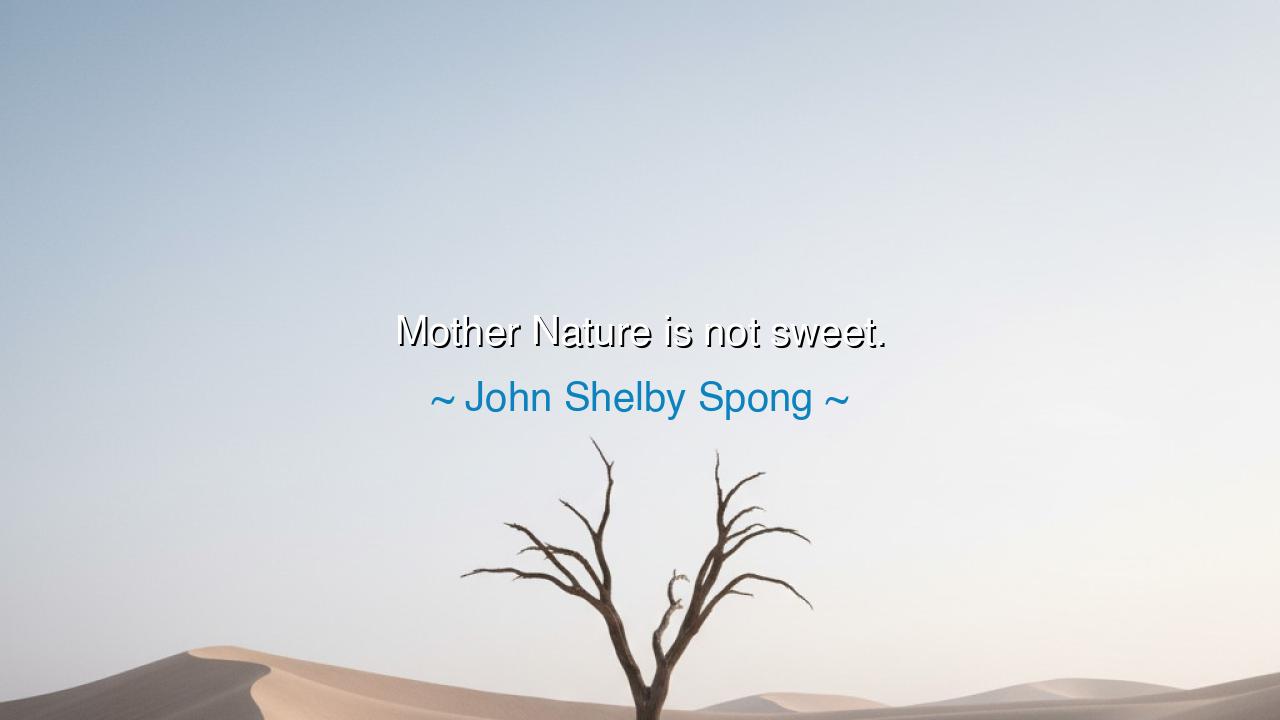
Mother Nature is not sweet.






In the piercing and unflinching words of John Shelby Spong, the theologian who dared to question old assumptions and seek divine truth in the reality of life itself, we find a lesson both humbling and profound: “Mother Nature is not sweet.” This brief sentence carries the weight of ages. It is a reminder that nature, though wondrous and life-giving, is not a gentle nursemaid, but a fierce and impartial force—one that gives and takes with equal measure. Spong, a man of both faith and reason, spoke these words to awaken us from our romantic illusions, to call us to see the truth of creation not through sentimentality, but through understanding.
For in truth, Mother Nature is not a kindly grandmother who soothes all sorrows. She is majestic, yes—but also wild, indifferent, and immense. Her beauty hides her power; her serenity cloaks her storms. The same ocean that cradles the sunrise can drown a ship in seconds; the same fertile earth that yields a harvest can split open in earthquake and fire. To call her “sweet” is to misunderstand her nature—to reduce her to comfort when she is also chaos, to praise her bounty while forgetting her justice. Spong’s words are a call to reverence without illusion, to recognize that the world we inhabit is not designed for our comfort, but for our growth, our endurance, and our awe.
From the dawn of civilization, humans have wrestled with this paradox. The ancients bowed to the Earth and the Sky, naming them gods because they saw both their kindness and their wrath. The farmer gave thanks for the rain yet feared the flood; the sailor loved the sea yet prayed to survive it. They knew what modern man too easily forgets—that to live is to dwell between gift and danger, to be sustained by forces that neither love nor hate, but simply are. Nature is not moral; she is eternal. She is not sweet, because sweetness belongs to sentiment, and she is far greater than sentiment.
Consider the story of Pompeii, the ancient city that flourished beneath the shadow of Mount Vesuvius. Its people built temples, markets, and theaters, living in joy beneath blue skies. Yet one day, the mountain that had long seemed benign erupted with fire and ash, burying the city in moments. In that instant, all illusions of safety vanished. The earth itself, which had nurtured their lives, consumed them. And yet, centuries later, when the city was unearthed, it stood as both a tragedy and a revelation: that life and death, creation and destruction, are threads of the same vast design. This is what Spong meant—the sacred truth that Mother Nature, in her fullness, is not sweetness, but reality itself.
But to say she is not sweet is not to say she is cruel. Cruelty implies intention, and Nature has none. She simply moves, breathes, evolves. Her hurricanes are not punishments, her plagues not vendettas. She gives birth to beauty, and she reclaims it without malice. The tiger hunts not from hatred, but from hunger; the storm rages not from spite, but from balance. Spong, as a theologian, understood that to truly know the divine, one must accept the world as it is—not as we wish it to be. Faith, he taught, is not denial of the world’s hardness, but the courage to live within it with open eyes.
And yet, within her ferocity, there is also wisdom. For Nature, in her unyielding way, teaches us humility. She reminds us that we are not her masters, but her children. She humbles the arrogant and strengthens the wise. The hurricane, the drought, the fire—these are not her revenge, but her rhythms. Those who live in harmony with them endure; those who forget them perish. The indigenous peoples of the earth have always known this truth: they revere the storm as much as the sun, for they understand that both are needed for life to continue. Nature’s harshness is her teaching; her indifference is her equality.
So, O listener, take this teaching to heart: do not seek sweetness in Mother Nature, but respect her. Stand before her with both awe and caution. When the sky darkens and the wind rises, do not curse her, for she owes you nothing. Instead, learn her laws. Protect her balance, for your life depends on it. Build your strength to match her storms, and your gratitude to match her gifts. Do not expect her to comfort you—but let her inspire you, awaken you, and teach you how to endure.
For in the end, John Shelby Spong’s words are not of despair, but of awakening. To see that Nature is not sweet is to see her as she truly is: vast, magnificent, and eternal. She is the mirror in which we glimpse both our fragility and our belonging. To love her rightly is to love truth itself—to accept that beauty is born of struggle, that peace is forged in balance, and that life, in all its wildness, is sacred beyond comprehension. Embrace this truth, and you will walk not in fear, but in reverence—strong, humble, and fully alive beneath the infinite sky.






AAdministratorAdministrator
Welcome, honored guests. Please leave a comment, we will respond soon